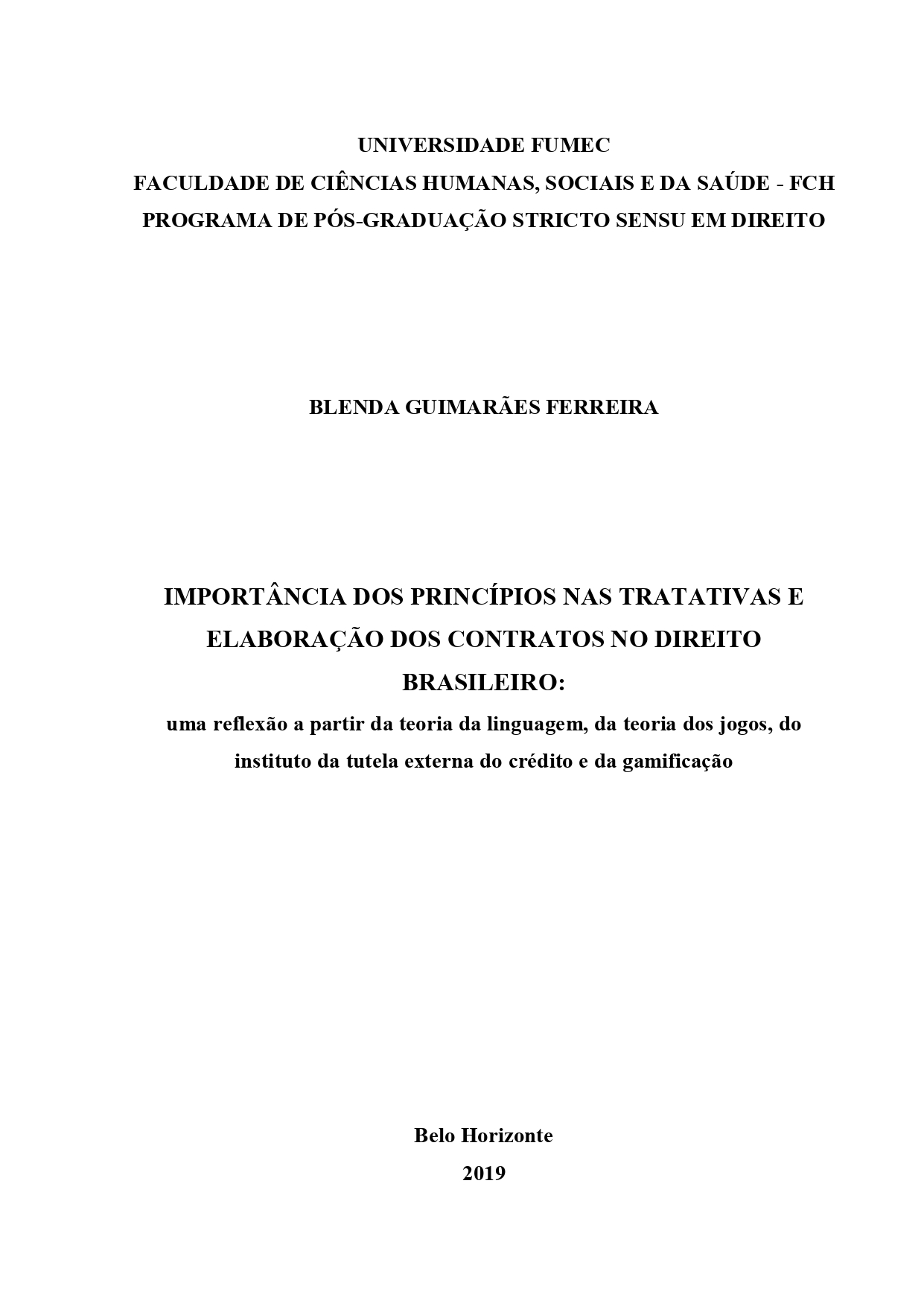Importância dos princípios nas tratativas e elaboração dos contratos no direito brasileiro: uma reflexão a partir da teoria da linguagem, da teoria dos jogos, do instituto da tutela externa do crédito e da gamificação

Visualizar/
Data
2019Autor
Ferreira, Blenda Guimarães
xmlui.mirage2.itemSummaryView.MetaData
Mostrar registro completoResumo
A presente dissertação tem como tema a importância dos princípios nas tratativas e elaboração
dos contratos no direito brasileiro. Como problema de pesquisa, o trabalho indaga se os
princípios possuem papel secundário e apenas no auxílio da interpretação dos contratos em
eventuais lides ou se são, de fato, um importante elemento, e de observância obrigatória na
sua elaboração. Como hipótese, afirma-se que os princípios são fundamentais nas tratativas
dos contratos, haja vista que sua inobservância pode gerar, inclusive, a nulidade do contrato,
atingindo terceiros, como demonstra o instituto da tutela externa do crédito. Justifica-se a
pesquisa pela necessidade de se demonstrar que os princípios não são meros auxílios
interpretativos, tornando-se parte primordial do contrato. O objetivo geral do trabalho é
investigar, dentro do neoconstitucionalimo, do uso da linguagem e da gamificação, como os
princípios devem atuar dentro do contrato no direito brasileiro. São objetivos específicos do
trabalho: (a) analisar os princípios e o neoconstitucionalismo brasileiro; (b) investigar como
os contratos são formados a partir do uso da linguagem e da teoria dos jogos; (c) identificar o
papel dos princípios nos contratos no direito brasileiro. A pesquisa adota, como marco
teórico, o conceito de teoria da linguagem do filósofo Ludwig Wittgenstein, que afirma que a
linguagem determina como as pessoas vão se comportar em determinas situações como – no
que se refere a presente pesquisa – no ato de contratar, e como o uso da linguagem é relevante
na ponderação de princípios. Quanto aos demais aspectos metodológicos, o trabalho adota
como raciocínio predominante o dedutivo; a pesquisa é do tipo bibliográfica, analisando os
dados extraídos das obras referenciadas. This dissertation has as its theme the importance of the principles in the dealings and
elaboration of the contracts in the Brazilian law. As a research problem, the paper asks if the
principles have a secondary role and only in helping the interpretation of the contracts in
eventual dealings or if they are, in fact, an important element, and of mandatory observance in
their elaboration. As a hypothesis, it is stated that the principles are fundamental in dealing
with contracts, since their failure to comply can even lead to the nullity of the contract,
affecting third parties, as shown by the institute of external credit protection. The research is
justified by the need to demonstrate that the principles are not merely interpretive aids,
becoming a primary part of the contract. The general objective of the work is to investigate,
within the neoconstitutional framework, the use of language and gamification, how the
principles should act within the contract in Brazilian law. Specific objectives of the work are:
(a) to analyze the principles and Brazilian neoconstitutionalism; (b) investigate how contracts
are formed from the use of language and game theory; (c) identify the role of principles in
contracts under Brazilian law. The research adopts, as a theoretical framework, the concept of
language theory of the philosopher Ludwig Wittgenstein, who states that language determines
how people will behave in certain situations such as - in the present research - in the act of
hiring, and how the use of language is relevant in weighting principles. As for the other
methodological aspects, the work adopts the predominant reasoning as deductive; The
research is bibliographic, analyzing the data extracted from the referenced works.
